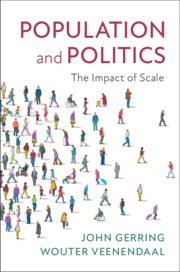Book contents
- Population and Politics
- Population and Politics
- Copyright page
- Contents
- Detailed Contents
- Figures
- Tables
- Preface
- Acknowledgments
- Part I Framework
- Part II Scale Effects
- 3 Cohesion
- 4 Representatives
- 5 Representativeness
- 6 Particularism
- 7 Participation
- 8 Contestation
- 9 Institutionalized Succession
- 10 Professionalism
- 11 Concentration
- 12 Intervention
- 13 Power
- 14 Civil Conflict
- 15 Other Outcomes
- Part III Conclusions
- Book part
- References
- Index
11 - Concentration
from Part II - Scale Effects
Published online by Cambridge University Press: 14 May 2020
- Population and Politics
- Population and Politics
- Copyright page
- Contents
- Detailed Contents
- Figures
- Tables
- Preface
- Acknowledgments
- Part I Framework
- Part II Scale Effects
- 3 Cohesion
- 4 Representatives
- 5 Representativeness
- 6 Particularism
- 7 Participation
- 8 Contestation
- 9 Institutionalized Succession
- 10 Professionalism
- 11 Concentration
- 12 Intervention
- 13 Power
- 14 Civil Conflict
- 15 Other Outcomes
- Part III Conclusions
- Book part
- References
- Index
Summary
In some polities the exercise of political power is highly concentrated, and in others it is widely dispersed. In Chapter 11, we examine the effects of scale on power concentration, arguing that the degree of horizontal and vertical concentration of power in a polity is affected by the number of people residing within that polity. The larger the polity, the more fragmented its institutional design is likely to be. This is a function of (1) increased heterogeneity, which entails that larger communities are difficult to govern in a concentrated fashion, and (2) lower levels of trust, which call for institutional constraints on the center that cannot be easily overcome. To tackle this vast subject we adopt a variety of country-level indicators of power concentration including subnational regions, federalism, bicameralism, revenue decentralization, capital city size, and checks and balances. We also probe a variety of subnational indicators focused on variation across states and localities within the United States. Most of these analyses support the contention that scale is associated with deconcentrated power.
Keywords
- Type
- Chapter
- Information
- Population and PoliticsThe Impact of Scale, pp. 249 - 272Publisher: Cambridge University PressPrint publication year: 2020



